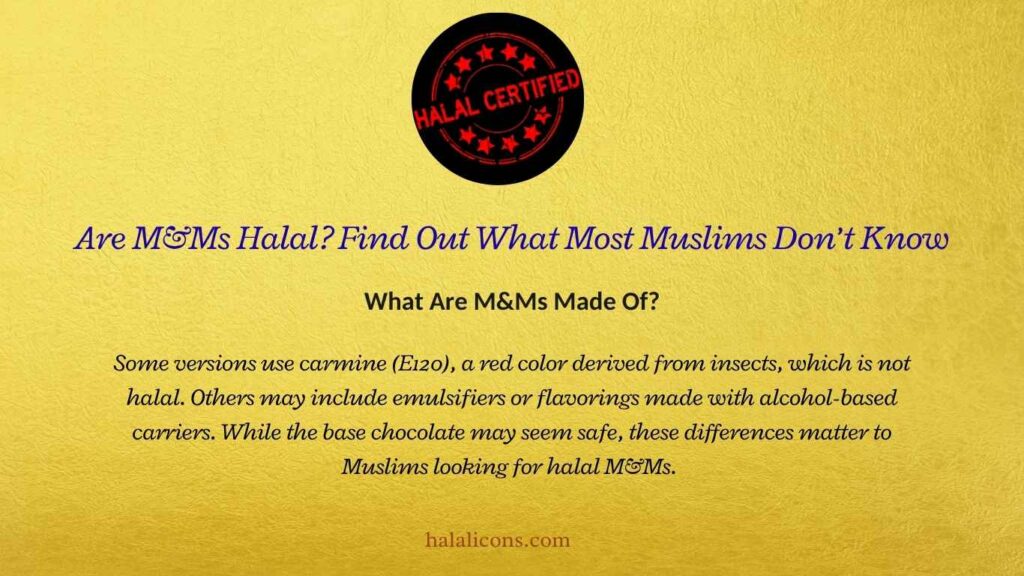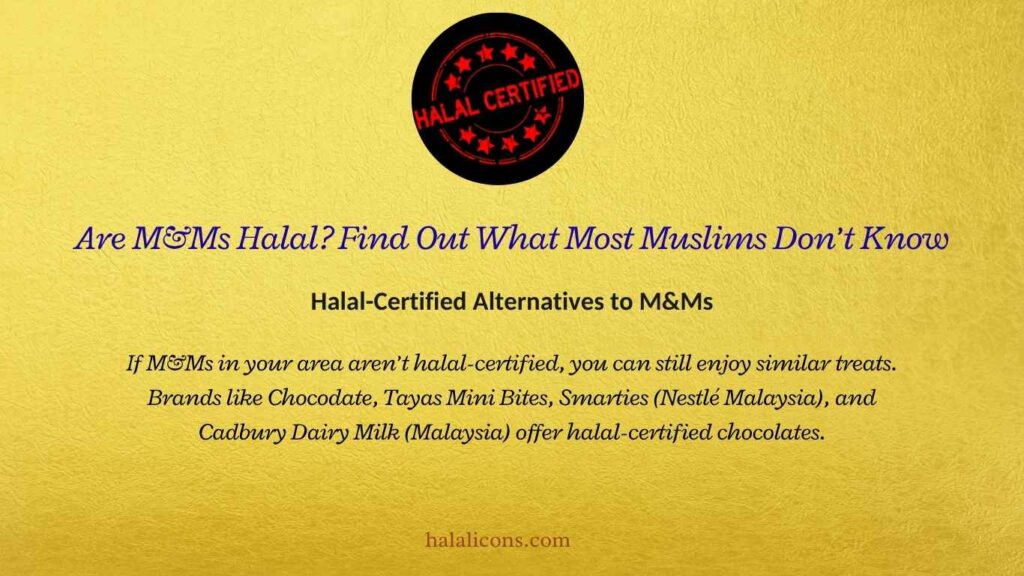Colorful, crunchy, and irresistibly sweet — M&Ms are loved worldwide. But for many Muslim consumers, one question often arises: Are M&Ms halal or haram? With so many varieties available globally, ingredient differences and regional manufacturing practices can make things confusing. Some packs are halal-certified, while others may contain ingredients that raise doubts, such as carmine (E120) or non-halal emulsifiers.
This guide explores everything you need to know — from M&Ms ingredients to halal certification, country-specific approvals, and what Islamic scholars say. Whether you live in the UK, USA, Australia, or Asia, this article will help you make an informed, confident choice about enjoying M&Ms while staying true to your halal lifestyle.
Understanding What “Halal” Means in Modern Food Products
Halal simply means “permissible” in Arabic, but when it comes to food, it’s more than just avoiding pork or alcohol. Modern food production involves complex processes — from flavoring and colorings to emulsifiers and equipment cleaning methods — all of which affect halal status.
Sometimes, even if ingredients seem fine, cross-contamination or alcohol-based flavoring can make a product doubtful, or haram. For snacks like M&Ms, knowing the full picture matters. Understanding halal isn’t just about ingredients but how those ingredients are sourced and processed.
That’s why it’s important to check halal certification, not just the ingredient list, before deciding if your favorite treat truly meets Islamic dietary guidelines.
What Are M&Ms Made Of?

M&Ms are made with simple-sounding ingredients like milk chocolate, sugar, cocoa butter, and color coatings — but not all are created equally. Depending on where they’re produced, M&M’s ingredients can differ.
Some versions use carmine (E120), a red color derived from insects, which is not halal. Others may include emulsifiers or flavorings made with alcohol-based carriers. While the base chocolate may seem safe, these differences matter to Muslims looking for halal M&Ms.
Regional recipes also change due to local laws and suppliers, so knowing what’s inside each pack — and where it’s made — is key to determining whether M&Ms are halal or haram.
You might also like: Is Welch’s Fruit Snacks HALAL?
Are M&Ms Halal or Haram According to Islamic Guidelines?
From an Islamic perspective, M&Ms fall into a gray area. They don’t contain pork gelatin, but certain ingredients — like carmine or alcohol-based flavorings — can make them questionable.
Many scholars consider uncertified M&Ms mushbooh until verified by a trusted halal certification body. The manufacturing process also matters — if non-halal ingredients are used on shared equipment, it may compromise the halal status.
Therefore, it’s essential to confirm whether M&Ms are halal-certified before eating. In short, M&Ms aren’t automatically halal or haram; their permissibility depends on where they’re produced and which ingredients are used.
Official Statement from Mars (M&M’s Manufacturer)
Mars, the company behind M&Ms, states that some of its products are not suitable for a halal diet in certain regions. This is mainly because M&Ms are not always produced under halal-certified conditions.
In countries like Malaysia or the UAE, Mars does offer halal-certified M&Ms approved by local authorities. However, in the UK, the USA, and Europe, most M&Ms packs are not halal-certified. Mars emphasizes that formulations vary depending on local suppliers and factory locations.
Two identical-looking packs could have different ingredients. Always check the product label or contact Mars Consumer Care for clarification before assuming all M&Ms are halal worldwide.
Country-by-Country Breakdown of M&M’s Halal Status
The halal status of M&Ms changes by region:
- USA & Canada: Not halal-certified and may contain ingredients like carmine.
- UK & Europe: Mars confirms M&Ms are not suitable for a halal diet.
- Australia: Some halal-certified versions exist (Mustakshif-listed).
- Malaysia & UAE: Fully halal-certified under local regulations.
- Pakistan & India: Imported batches may vary; always check packaging.
This variation shows why checking the halal logo and local certifications matters. Even if ingredients look similar, production standards differ. Always verify through official halal databases or directly from Mars before consuming M&Ms.
Ingredient-Specific Halal Concerns
Certain M&Ms ingredients create halal confusion. Carmine (E120) is made from crushed insects, making it haram. Lecithin, an emulsifier, can come from either soy (halal) or animal fat (haram). Mono- and diglycerides may also be animal-derived unless specifically plant-based.
Some natural flavorings are dissolved in alcohol, complicating their halal status. Even trace amounts in coatings can affect permissibility. Always read the ingredient list carefully and look out for these additives.
If you see questionable E-numbers, it’s best to avoid that variant unless it’s halal-certified by a trusted authority. Ingredient transparency is key for halal-conscious consumers.
Cross-Contamination & Production Line Issues
Even when ingredients appear halal, cross-contamination during manufacturing can make M&Ms unsuitable. Mars factories often produce both halal and non-halal products on the same equipment.
If non-halal flavorings or colorants are processed on shared lines, it a risk of contamination. From an Islamic perspective, this can affect halal integrity. Some factories in Malaysia and the UAE have separate halal-certified lines, but those in the USA and UK may not.
Always prefer M&Ms produced in halal-certified facilities. It’s not just what’s inside the pack — it’s also how and where it’s made that determines whether M&Ms are truly halal.
How to Verify If Your Pack of M&Ms Is Halal
Before enjoying M&Ms, check for a halal logo or certification on the packaging. Look for reputable authorities such as JAKIM (Malaysia), MUIS (Singapore), or HFA (UK).
If unsure, inspect the ingredient list for additives like E120 or alcohol-based flavorings. You can also contact Mars Consumer Services to confirm halal status in your region. In countries like Malaysia and the UAE, M&Ms are clearly labeled as halal.
However, in Western markets, they usually aren’t. Always cross-check using official halal product lists or regional certification databases before purchasing.
Are Different M&M Varieties Halal?
Not all M&M flavors share the same status. Peanut M&Ms and Crispy M&Ms may contain emulsifiers from animal sources. Caramel and Minis can use questionable flavorings, while Dark Chocolate M&Ms are often free from E120 but still lack halal certification in most regions.
In contrast, M&Ms sold in Malaysia and the UAE are halal-certified across varieties. Always check the flavor-specific label since each type may be produced in different factories.
Just because one pack is halal doesn’t mean all versions are. If you prefer certainty, opt for halal-certified alternatives or buy from verified halal regions.
What Do Islamic Scholars Recommend?
Most Islamic scholars agree that Muslims should verify halal certification before eating M&Ms. Since ingredients and manufacturing differ by region, scholars advise treating uncertified products as mushbooh (doubtful).
The presence of E120 (carmine) or alcohol-based flavoring is concerning. Scholars recommend avoiding doubtful items to ensure compliance with halal principles. If you live in a country where halal-certified M&Ms are available, you can enjoy them confidently.
Otherwise, choose confirmed halal alternatives or contact Mars for certification details. This mindful approach helps maintain halal integrity while supporting informed consumption.
Halal-Certified Alternatives to M&Ms

If M&Ms in your area aren’t halal-certified, you can still enjoy similar treats. Brands like Chocodate, Tayas Mini Bites, Smarties (Nestlé Malaysia), and Cadbury Dairy Milk (Malaysia) offer halal-certified chocolates.
Local halal confectioners in Pakistan, Malaysia, and the UAE also make candy-coated chocolates that resemble M&Ms. Always look for the halal logo before buying.
You can also make homemade halal chocolates using certified cocoa and colorings. These options ensure you enjoy sweets that align with your halal lifestyle. Choosing halal alternatives supports both faith and ethical eating.
You might also like: Is Sour Patch Kids Candy Halal?
Final Verdict — Are M&Ms Halal?
In short, M&Ms are not universally halal. While they’re halal-certified in regions like Malaysia and the UAE, M&Ms made in the UK, USA, and Europe are not.
Some versions contain non-halal ingredients or are produced in non-halal-certified facilities. Therefore, their halal status depends entirely on where they’re made and packaged. Always verify the halal certification mark, read ingredient labels, and consult local halal listings before consuming.
For Muslims seeking full assurance, choose halal-certified chocolates instead. Staying informed ensures your snacks remain both delicious and halal.
FAQs
1. Are M&Ms halal?
Not all M&Ms are halal. Some are halal-certified in Malaysia and the UAE, but most in the USA and UK are not.
2. Are Peanut M&Ms halal?
Peanut M&Ms may include emulsifiers or flavorings from animal sources. Always check the halal logo or ingredient list.
3. Do M&Ms contain gelatin?
Most M&Ms don’t contain gelatin, but some include carmine (E120) or alcohol-based ingredients that make them non-halal.
4. Are M&Ms halal in the USA?
No, M&Ms sold in the USA are not halal-certified, according to Mars Inc.
5. Are M&Ms halal in the UK?
No, M&Ms in the UK are not halal-certified. Mars states they’re unsuitable for a halal diet.
6. Are M&Ms halal in Australia?
Some Australian M&Ms are halal-certified and listed by Mustakshif, depending on batch origin.
7. Are M&Ms halal in Malaysia and the UAE?
Yes, M&Ms in Malaysia and the UAE are officially halal-certified by local halal authorities.
8. What makes M&Ms haram?
Ingredients like E120 (carmine), alcohol-based flavorings, or animal-derived emulsifiers make some M&Ms haram.
9. Are all M&M varieties halal?
No, each variety has different ingredients. Always confirm halal certification, especially for limited editions.
10. What are some halal alternatives to M&Ms?
Try Chocodate, Tayas Mini Bites, Smarties (Malaysia), or Cadbury Dairy Milk — all are halal-certified options.
Qamar Ul Haq is an Islamic historian and writer with a passion for uncovering the rich heritage of Muslim civilizations. Through in-depth research and storytelling, He brings to life the achievements, struggles, and contributions of the Ummah throughout history.